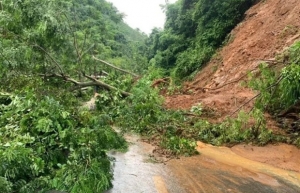Climate tasks must be ramped up
Globally, climate change has intensified the frequency and severity of natural disasters. A report presented at the COP29 climate summit in Azerbaijan last week revealed that since 2014, extreme weather events caused $2 trillion in global economic losses, comparable to the 2008 global financial crisis. Hurricanes Helene and Milton alone inflicted $50 billion in damages each in the United States in October this year.
 |
| Vietnam can look to other nations that employ intelligent disaster response systems, photo Le Toan |
Vietnam, ranked among the most disaster-prone nations globally, faces similar challenges. Data from the Ministry of Planning and Investment indicates that Typhoon Yagi, which struck in September, caused over $50 billion in damage, shaving 0.15 percentage points off Vietnam’s projected GDP growth for the year.
“Disasters are exacting an ever-greater toll, both globally and here in Vietnam,” said Le Thi Thuy Van, deputy director of the Institute of Strategy and Financial Policy, at a seminar on finance and disaster risk insurance last week. “They not only cause loss of life and property but also pose a significant threat to our socioeconomic development. This is not an isolated event. In recent years, disasters have reduced Vietnam’s GDP by 1-1.5 per cent annually.”
Direct economic losses from typhoons and floods make Vietnam the third most-affected country in Southeast Asia, following Myanmar and the Philippines. Beyond the immediate financial toll, these disasters disrupt millions of lives, damage infrastructure, and slow long-term development.
Vietnam has mobilised financial resources to address these challenges, drawing on state budget reserves, contingency funds, agricultural insurance, and voluntary contributions from domestic and international stakeholders. However, Van highlighted significant gaps in the system. “The system remains underfunded and over-reliant on state budgets. Local resources are often insufficient, forcing central government intervention,” Van said.
Efforts to integrate disaster risk data into national systems are ongoing, but uneven progress has left the country with limited tools for risk assessment and prevention, further exposing its economy to recurring losses.
International examples offer valuable lessons for Vietnam. Japan’s earthquake insurance system, underpinned by robust legal frameworks, provides sustainable disaster response mechanisms. The Philippines employs parametric insurance for public assets, which enables rapid payouts triggered by specific thresholds, such as rainfall or wind speed. Colombia, in partnership with the World Bank, has developed a disaster risk financing system that eases fiscal burdens while improving resilience.
“These countries demonstrate how robust legal frameworks and innovative financial tools can transform disaster management,” said Dr. Nguyen Thi Hai Duong of the Insurance Faculty at the National Economics University.
She urged Vietnam to consider index-based and layered risk insurance models for more efficient financial support during crises.
“There is a need to tailor disaster risk models to Vietnam’s unique vulnerabilities, develop more disaster insurance products, and foster public-private partnerships. Collaboration with international organisations and the private sector will be key to advancing disaster risk insurance in Vietnam,” Duong added.
Vietnam must also shift from a reactive to a preventative disaster management approach. Duong proposed a comprehensive system of pre- and post-disaster financing tools, enhanced risk assessment capabilities, and accelerated adoption of insurance for public and private assets.
“Public asset insurance is a critical piece of the puzzle. Pilot initiatives have faced regulatory inconsistencies and limited financial resources. Addressing these hurdles will be crucial to achieving a functional and sustainable disaster insurance framework,” Duong explained.
Typhoon Yagi served as a wake-up call, prompting consumers to reconsider the importance of insurance in mitigating financial risks from natural disasters, noted FiinGroup last month.
“Following the Yagi shock, insurers will need to rethink how they operate,” said FiinGroup. “Companies must leverage technology to expedite damage assessments and provide faster compensation to affected clients. Digital tools are essential for enhancing efficiency and improving customer satisfaction in the wake of large-scale disasters.”
 | PM: More measures needed to deal with natural disaster consequences Prime Minister Nguyen Xuan Phuc on December 2 ordered more efficient measures to overcome consequences caused by natural disasters and help affected residents return to their normal lives. |
 | Int’l organisations continue early action support for Vietnam to reduce disaster risks The national steering committee for natural disaster prevention and control held a meeting with international partners in Hanoi on December 8, highlighting the role of early warning and early action in natural disaster risk mitigation. |
By 2070, under a high-emissions scenario, climate change is projected to reduce Vietnam’s GDP by 30.2 per cent, among the highest losses in the region. Sea-level rise alone could result in a 15 per cent GDP loss for the country, compared to 6.3 per cent for the Asia-Pacific region.
Other factors contributing to Vietnam’s economic losses include reduced labour productivity due to heatwaves (8.5 per cent), increased river flooding (6.5 per cent), and damage to natural resources (4.1 per cent).Source: Asian Development Bank
What the stars mean:
★ Poor ★ ★ Promising ★★★ Good ★★★★ Very good ★★★★★ Exceptional
Related Contents
Latest News
More News
- QBE Vietnam: 20-year journey of building trust and enabling resilience (November 20, 2025 | 14:25)
- Hanwha Life hosts training course in South Korea for Vietnamese fintech talents (November 20, 2025 | 09:51)
- Insurers accelerate post-typhoon recovery (October 28, 2025 | 15:31)
- Shinhan Life Vietnam builds growth on people strategy (October 07, 2025 | 09:45)
- Insurance sector initiates rapid response after Typhoon Bualoi devastation (October 03, 2025 | 18:25)
- Non-life insurers face mounting pressure after typhoon hits motor sector (October 02, 2025 | 18:59)
- Prudential Vietnam delivers responsible investment package (September 25, 2025 | 10:37)
- Insurers struggle to keep pace with EV rapid adoption (August 29, 2025 | 17:12)
- Non-life insurance market in sees bright spots in H1 despite rising challenges (August 28, 2025 | 16:21)
- Life insurance rebounds with renewed growth and trust (August 06, 2025 | 18:04)

 Tag:
Tag:


















 Mobile Version
Mobile Version